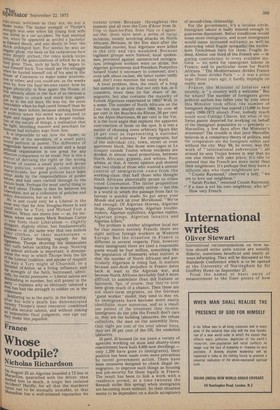P rance
Whose Woodpile?
Nicholas Richardson
()in August 25 an Algerian boarded a 72 bus in Marseilles quarrelled with the driver, then Wed him to death. A tragic but isolated Incident? Hardly, for all that the murderer ,1,1?rns out to be mentally unstable, or that Marseilles has a well-attested reputation for
violent crime. Because throughout the summer and all over the Cote d'Azur from St. Trop to Juan-les-Pins, from Nice to Cagnessur-Mer, there have been a series of racial incidents, mostly involving attacks on North Africans. Because, in the five days after the Marseilles murder, four Algerians were killed in the city and two wounded'. Because vigilante groups were formed, local spokesmen protested against unrestricted immigration, immigrant workers went on strike, the Algerian government and President Pompidou himself found it necessary to comment; don't even talk about racism, the latter rather oddly said, don't even mention the nasty word.
A local problem, then, the result of a long hot summer in an area that not only has, as it considers, more than its • fair share of immigrants, but also contains the majority of French Algerians repatriated in 1962? Well, in a sense. The number of North Africans on the Cote has risen sharply since 1968; by over 40 per cent in the Bouches-du-Rhone, 50 per cent in the Alpes-Maritimes, 60 per cent in the Var. It is the local angle that explains the apparent over-reaction of those on the spot. It is less a matter of choosing some arbitrary figure like 10 per cent as representing a national 'threshold of tolerance' for immigrants, but of the individual city, town, street or even apartment block, like those wire-cages at Le Jonquet outside Toulon whose residents are divided, in almost equal proportions, between North Africans, gypsies, and whites. Poor whites, at that. A recent opinion poll showed that two thirds of those who wanted a stricter control of immigration came from the working-class: that half those who thought North Africans abnormally prone to crime voted Communist. The latter proposition happens to be demonstrably untrue — but this is a world in which the passage from fact to fantasy is quickly made. So put away your Monde and pick up your Meridional, "We've had enough. Of Algerian thieves, Algerian thugs, Algerian braggarts, Algerian troublemakers, Algerian syphilitics, Algerian rapists, Algerian pimps, Algerian lunatics and Algerian killers."
The problem is neither altogether local nor for that matter entirely French; there are eight million foreign workers in Western Europe, But the situation in France is different in several respects. First, however many immigrants there are (and a reasonable guess would be four million, something like the population of Denmark) what matters is that the number of North Africans and particularly Algerians is rising fast. It matters because anti-Arab prejudice in France dates back at least to the Algerian war, and because North Africans inevitably find it more difficult to assimilate than did Italians or Spaniards. Npt, of course, that they've ever been given much of a chance. Then these are not short-term migrants, on the German guest worker' model; they tend to stay on. So immigrants have become more easily identifiable, more numerous, and as a result less patient of the treatment they receive. Immigrants do the jobs the French don't care to, they are the building labourers, the refuse collectors, the men on the assembly lines. Only eight per cent of the total labour force, they are 20 per cent of the OS, the unskilled labourers.
Ill-paid, ill-housed (in ten years a variety of agencies working on slum and shanty-town resettlement have built 8,000 new dwellings — only 1,200 have gone to immigrants), their position has been made even more precarious by recent government action. There have been measures designed to check illegal immigration, to improve such things as housing and job-security for those legally in France. The result has been to link a work with a residence permit, at a time (witness the Renault strike this spring) when immigrants are becoming more militant. So their situation seems to be dependent on a docile acceptance of second-class citizenship.
For the government, it's a vicious circle. Immigrant labour is badly treated enough to guarantee discontent. Better conditions would mean more immigrants, and more immigrants would mean increased militancy as well as destroying what fragile sympathy the nativeborn Frenchman feels for them. Fragile indeed. Almost one third of the French see — in glaring contradiction to every available statistic — no need for immigrant labour in France, and in particular none for North Africans. "The Mediterranean divides France as the Seine divides Paris " — it was a pious hope fifteen years ago; it hardly impinges on reality now.
France, the Minister of Interior said recently, is "a country with a welcome." But for whom? The number of foreigners given political asylum has fallen year by year since this Minister took office, the number of foreigners deported has soared (13,000 in four years 1969-1972 alone). Fine, nobody much would want Eldridge Cleaver, but what of the Swiss pastor deported for working on behalf of the immigrant population in — precisely — Marseilles, a few days after the Minister's statement? The trouble is that poor Marcellin believes in a conspiracy theory of politics, and the conspirators are the foreigners within and without the city. May '68, he wrote, was the work of " international subversion "; all around he sees Trojan horses in war that no one else thinks will take place. It's idle to pretend that the French are more racist than their neighbours. It's perhaps that they have a different idea who these neighbours are . .
"Cousin Raymond," observed a lady, "we are to love our neighbour."
"Sarah Pocket," returned Cousin Raymond, -" if a man is not his own neighbour, who is?" How very French.


































 Previous page
Previous page